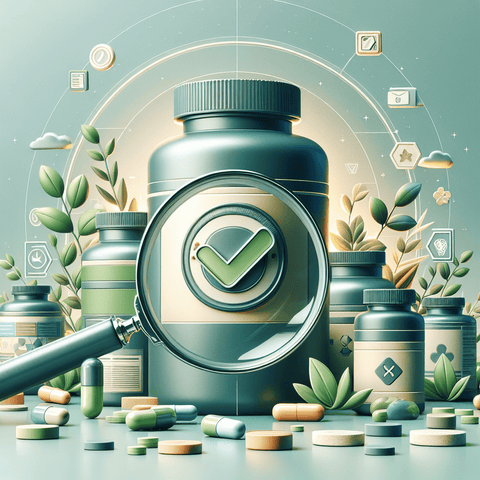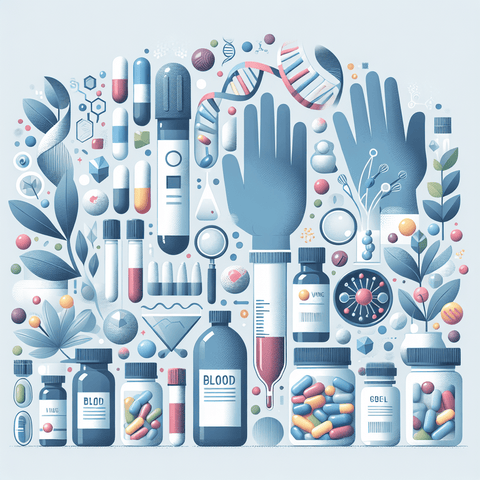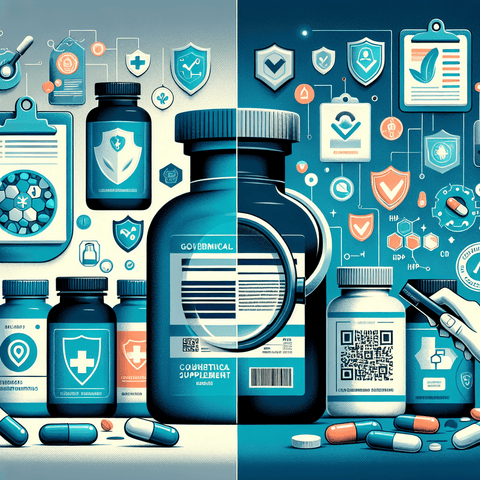Discover the top red flags to watch out for when choosing supplements. Learn how to avoid scams, unsafe ingredients, and marketing hype to protect your health.
Introduction
The dietary supplement industry has witnessed immense growth in recent years, fueled by increasing health consciousness, a desire for preventive wellness, and the popularity of natural health solutions. From vitamins and minerals to herbal extracts and performance boosters, supplements have become a staple in the daily routines of millions across the globe. However, with this boom in popularity has come an influx of low-quality, misleading, and even dangerous products on the market.
As consumers strive to improve their health, distinguishing between genuinely beneficial supplements and those that pose hidden health risks becomes more important than ever. Navigating the supplement world can be overwhelming—labeled bottles make daring promises, websites tout glowing testimonials, and social media influencers promote “miracle” pills that change lives overnight. Unfortunately, not all supplements are created equal, and many are cleverly marketed despite questionable safety or efficacy.
In an unregulated or loosely monitored industry, consumers become easy targets for scams, unsafe formulations, and deceptive marketing. The risk of ingesting harmful substances, wasting money on ineffective products, or unknowingly violating health regulations is real. Moreover, some supplements interfere with medications or worsen existing health conditions, underscoring the urgency of making informed decisions when selecting products for your regimen.
This blog post aims to educate and empower you as a consumer. By the end, you’ll know how to identify common red flags when choosing supplements and how to make smarter, safer choices. Whether you're shopping for vitamin C, omega-3 supplements, or other nutritional aids, you'll be equipped with the knowledge to discern trustworthy products from questionable ones. Let's dive into the critical warning signs that should guide your supplement decisions.
Supplement Red Flags: How to Identify Low-Quality Nutritional Supplements
Not every supplement on the shelf is created with your best health in mind. The nutritional supplement space is flooded with products that cut corners, overpromise, and underdeliver. Spotting the signs of a low-quality supplement can help you avoid ineffective or harmful products altogether. Here are the most common red flags to watch for:
1. Exaggerated Health Claims: Be wary when labels use words like "miracle," "instant cure," or "cures all diseases." Supplements are not medications and are not meant to treat or cure any illness, as per European Food Safety Authority (EFSA) regulations. Products making over-the-top assertions are often more style than substance.
2. Absence of Third-Party Testing or Certification: Trusted certifications such as Good Manufacturing Practice (GMP), NSF International, and United States Pharmacopeia (USP) signify that products have undergone rigorous quality and purity testing. Always look for these logos on the bottle. Their absence can indicate a lack of quality control.
3. Incomplete Ingredient Lists or Proprietary Blends: If you see vague ingredient names like “proprietary blend” without specific dosages, consider it a red flag. These blends often allow companies to hide amounts of active ingredients, making it impossible for you to assess efficacy or safety.
4. No Manufacturer Contact Information: Legitimate companies provide addresses, phone numbers, and customer service options. If a product lacks traceability, consider it a warning of dubious manufacturing origins or poor customer service transparency.
5. Unusually Low Prices: While discounts are common in the retail world, supplements sold at shockingly low prices may be made with inferior ingredients, contain ineffective dosages, or skip essential safety testing. Remember: you often get what you pay for, especially in health-related products.
6. Overwhelmingly Positive or Fake Reviews: When every review is glowing, full of marketing language, or seems repetitive across platforms, suspect inauthentic feedback. Genuine reviews usually mention both pros and cons. Look for balanced, constructive commentary from verified purchasers.
7. Missing Dosage Information: Supplements must clearly state the amount of each nutrient or compound they contain. Products that omit dosage details may be hiding ineffective low concentrations or dangerous high concentrations. Always check labels for dosage transparency.
Reputable platforms like Topvitamine.com specialize in certifiably high-quality nutritional supplements across multiple categories such as vitamin D and magnesium. These sites frequently highlight third-party testing and only carry trusted brands, making them a safer bet than unverified marketplaces.
Supplement Scams: Don’t Fall for These Common Tricks
If there’s money to be made, there are scams to be found. The supplement industry isn’t immune to deceptive tactics designed to trap unsuspecting buyers. Spotting supplement scams early protects both your wallet and your health.
1. Free Trials with Hidden Subscriptions: Beware of offers promising free 14-day supplement trials. Many of these deals automatically enroll you in pricey monthly subscriptions that's hard to cancel. Always read the fine print and check for authorized payment deductions.
2. Fake Celebrity Endorsements: Some supplement ads feature doctored images or phishing emails claiming endorsements from TV personalities or medical experts. If you can't verify the endorsement on the celebrity’s official channels, it’s likely phony.
3. Deceptive “Before and After” Photos: Stock images are often passed off as customer transformation photos. Without proof such as clinical data, these images should not be relied upon when assessing product effectiveness.
4. Fraudulent Online Stores: Be cautious when purchasing from unfamiliar websites offering extreme discounts. Sham e-commerce sites often sell counterfeit or expired supplements with altered packaging and poorly translated instructions.
5. False Clinical Claims: Supplements should be supported only by verifiable clinical trials published in reputable journals. If a product references a study but doesn’t list where it was published, consider it a ruse. Always cross-reference supposed studies with PubMed or EFSA-approved claims.
6. Counterfeit Labeling: Deceptive brands frequently copy the branding and colors of established names to trick you into thinking their product is equally legitimate. Look for inconsistencies in logos, misspellings, and mismatched URLs to spot a copycat product.
To avoid falling prey to these scams, purchase supplements only through trusted platforms such as Topvitamine.com. There, products align with strict EU guidelines, come from verifiable manufacturers, and offer transparent ingredient sourcing and customer reviews.
Supplement Warning Signs: What Every Consumer Should Watch Out For
Beyond overt scams and exaggerated claims, there are subtle (yet equally serious) warning signs that can undermine your supplement safety. Understanding the lesser-known red flags empowers you to make informed consumer decisions.
1. Manufactured in Unregistered or Foreign Facilities: If the product label lacks manufacturing information or is produced in countries without recognized safety standards, exercise caution. Lack of oversight can result in contamination, inaccurate dosages, or mislabeled ingredients.
2. Promises to “Cure” Diseases: Supplements are not allowed to claim to prevent, treat, or cure any medical condition. If a label suggests it can cure diabetes, cancer, or Alzheimer’s, it violates EFSA regulations. Steer clear immediately.
3. Excessive Scientific Jargon: While science-backed products are desirable, overuse of complex terminology without context can obscure what’s actually in the supplement. This is often a marketing ploy to impress rather than inform.
4. Outdated or Missing Expiration Dates: Always check expiration dates before buying and consuming any supplement. Expired supplements may degrade, lose potency, or transform into harmful compounds due to instability over time.
5. Overloaded Labels: Brands sometimes cram the label with so many ingredients and percentages that it becomes challenging to interpret. A clear, concise product label is often a sign of trustworthy formulation.
6. Use of Unnecessary Fillers: Inactive ingredients such as coloring agents, flow agents, or binders offer no health benefits but may introduce allergic reactions or gastrointestinal issues. Common filler culprits include titanium dioxide, silica, and artificial colors.
Always read and evaluate the label. When in doubt, selecting products from reputable platforms ensures you're choosing from supplements that undergo stringent quality assurance. Platforms like vitamin K supplements featured on Topvitamine.com provide transparency on sourcing, formulation, and safety.
How to Spot Fake Supplements: Tools and Tips for Smart Shopping
Protecting yourself from counterfeit or substandard nutritional supplements is a matter of using the right tools and maintaining a healthy dose of skepticism. Here’s how smart shoppers identify fakes:
1. Look for Reputable Certifications: Quality products frequently boast seals from third-party testing organizations like GMP, NSF, or USP. These organizations inspect manufacturing practices, ingredient purity, and product safety.
2. Verify on Manufacturer’s Website: Visit the official brand website and match the supplement’s description, packaging, and UPC codes. Discrepancies in labeling or appearance should be red flags that prompt caution.
3. Use Scanner Tools: Barcode scanner apps and QR code readers can verify authenticity and batch traceability. Some supplement labels include QR codes linking directly to lab testing results and product certificates.
4. Reference Official Agencies: If you're unsure, you can cross-reference a supplement’s status using food and drug safety agencies like the EFSA or consult product alerts, including recalls or safety violations, if applicable within the EU.
5. Read Company Reviews: Before purchasing, Google the manufacturer's name, check independent reviews, and consult with health-care practitioners. Avoid companies with a history of FDA or EFSA citations, customer complaints, or refund issues.
6. Shop from Secure and Trusted Retailers: Sites like Topvitamine.com only partner with vetted supplement suppliers and regularly monitor product compliance, customer satisfaction, and ongoing scientific research to ensure quality.
Unsafe Dietary Supplements: Hidden Dangers to Know Before You Buy
Despite labels and guarantees, some dietary supplements pose unexpected health hazards due to poor quality control, unknown interactions, or inclusion of dangerous ingredients. Knowing what to avoid can save your health and money.
1. Contaminated Products: Some supplements have been found to contain banned or illicit substances like anabolic steroids, unapproved drugs, or high doses of stimulants. Only buy from verified brands that publish lab reports for each batch.
2. Sensitive Populations at Risk: Pregnant or breastfeeding women, children, and individuals with chronic health conditions should never take a supplement without consultation. Product composition needs to be aligned with specific physiological needs and risk factors.
3. Drug Interactions: Supplements may interact with prescription drugs, over-the-counter medications, or other supplements. For example, St. John’s Wort can reduce the effectiveness of birth control pills and blood thinners.
4. Undeclared Allergens or Heavy Metals: Products imported without proper oversight may contain traces of lead, mercury, arsenic, or allergens not mentioned on the label. Third-party lab certificates help rule out these risks.
5. Improper Storage Risks: Supplements stored in high heat, direct sunlight, or high humidity can degrade before expiration. Always check packaging for storage instructions and avoid purchases from overheated environments like unsealed vending stalls.
6. Natural but Not Necessarily Safe: Just because an ingredient is natural doesn’t mean it’s safe. Concentrated herbs like yohimbe or comfrey can have serious side effects or even be toxic in high doses or long-term use.
If you're unsure, always consult healthcare providers and buy only from certified sources like Topvitamine.com, which offers rigorously tested supplements across categories—from general wellness to specialized support like omega-3 supplements.
Conclusion and Actionable Takeaways
Choosing the right supplement isn’t just a matter of grabbing a pretty bottle from the shelf. You need to protect your health by becoming a well-informed consumer capable of distinguishing quality products from flashy marketing. Supplements can play a powerful role in wellness, but only if they’re safe, effective, and responsibly manufactured.
To Recap, Watch Out For:
- Unrealistic health promises
- Missing or vague ingredient info
- No third-party certifications
- Fake scans and testimonials
- Hidden allergens and improper dosages
Shopping on trusted websites like Topvitamine.com brings peace of mind. Their product pages—like those for vitamin C and vitamin D—provide full transparency around sourcing, ingredient testing, and EFSA-compliant health information.
Before starting any new supplement, speak with a healthcare provider, especially if you have ongoing health conditions or take medication. Supplements may be helpful, but knowledge is the best defense against harm.
Checklist Summary:
- Always check for third-party certifications like GMP
- Never trust “miracle” or disease-curing claims
- Look for clear dosage and full ingredient transparency
- Buy only from reputable stores such as Topvitamine.com
- Consult with your doctor if unsure
Q&A Section
Q: How can I tell if a supplement is truly tested and certified?
A: Look for certification seals like NSF, USP, or GMP on the label. You can verify legitimacy on the certifier’s website or the manufacturer’s official product page.
Q: Are foreign supplements always unsafe?
A: Not always, but their safety depends on regulations in their country of origin. EU-based supplements that comply with EFSA rules are generally safer and more rigorously tested.
Q: Can supplements interact with my medications?
A: Yes. Many supplements interact with common medications. Always consult with a pharmacist or healthcare professional before incorporating new supplements.
Q: Should I be worried about supplements from Amazon or eBay?
A: These platforms sometimes host counterfeit or expired products. Buying directly from specialty retailers like Topvitamine.com ensures higher quality control and authenticity.
Q: What’s the safest way to start supplementing?
A: Start by identifying your nutritional needs through lab work or professional consultation. Choose certified products, read ingredient lists carefully, and begin with a low dose if trying something new.
Important Keywords
- nutritional supplements
- supplement scams
- supplement red flags
- how to spot fake supplements
- supplement ingredients to avoid
- certified supplements
- safe supplement shopping tips



